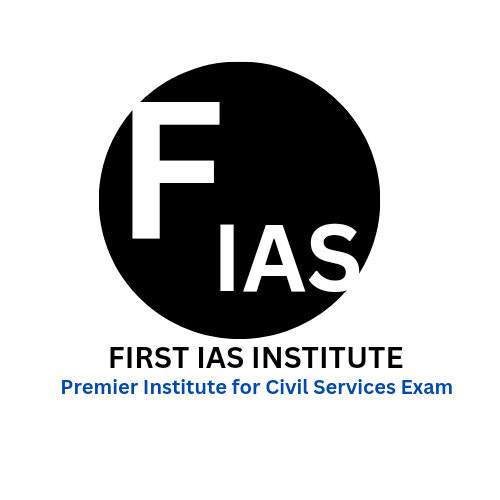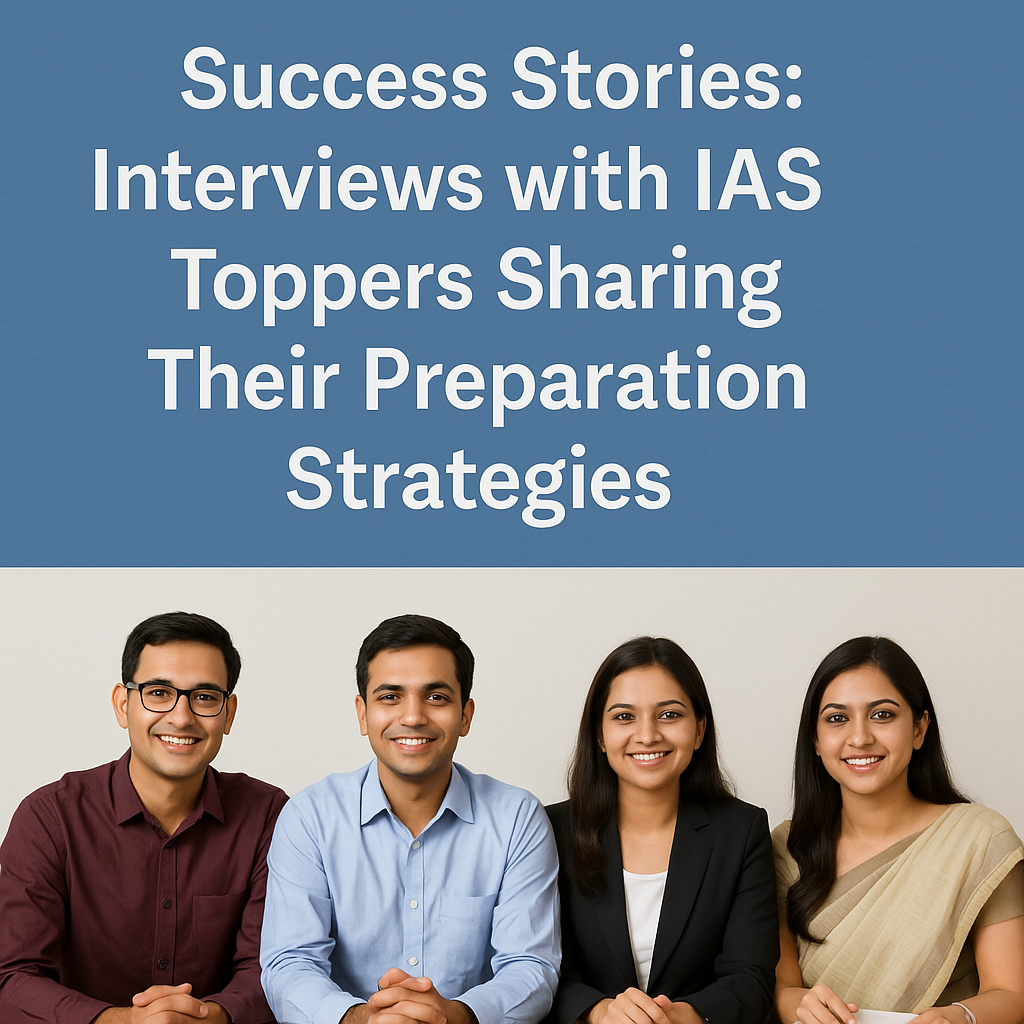Success Stories: Interviews with IAS Toppers Sharing Their Preparation Strategies
The journey to becoming an Indian Administrative Service (IAS) officer is one of immense dedication, strategic planning, and relentless perseverance. Every year, thousands of aspirants dream of cracking the UPSC Civil Services Examination, but only a few manage to make it to the final list. Among these achievers are individuals who not only clear the exam but do so with flying colors. Their stories inspire countless others and provide valuable insights into effective preparation strategies.
In this blog, we bring you real conversations and preparation strategies of successful IAS toppers who have generously shared their unique approaches, study techniques, and lessons learned along the way. These stories not only reflect their grit and determination but also provide a roadmap for other aspirants walking the same path.
Join WhatsApp community for Free Notifications, Updates, Study Material, Mock Tests, Internship Updates, and Current Affairs - CLICK HERE TO JOIN
Meet the Toppers
1. Anu Kumari (AIR 2, UPSC CSE 2017)
A mother and a homemaker before she began her UPSC journey, Anu Kumari's story is nothing short of inspirational. With a background in MBA from IMT Nagpur, she decided to chase her dream of becoming a civil servant after a corporate career.
Her Strategy: Anu’s preparation was marked by laser-sharp focus and disciplined study. She allocated more than 10 hours a day to studying and followed a strict schedule. Her strategy was based on self-study, thorough understanding of the syllabus, and consistent answer writing practice.
“The first step is believing that you can do it. I knew I had responsibilities, but I also had a dream. I chose to stay away from distractions, even from my phone, and devoted my time fully to preparation.”
Her Advice:
- Limit your sources and revise them multiple times.
- Practice mock tests regularly, especially for Prelims.
- Build a strong conceptual foundation for Mains and write answers daily.
2. Gaurav Agarwal (AIR 1, UPSC CSE 2013)
An IIT and IIM graduate, Gaurav left a lucrative investment banking job to prepare for the civil services exam. His journey is a testament to the power of determination and purposeful action.
His Strategy: Gaurav focused on understanding rather than rote learning. He emphasized planning, saying that UPSC preparation should be treated like a project — with milestones, timelines, and consistent reviews.
“You need to treat your preparation as a job. Work with discipline, be honest with yourself, and always strive to improve.”
His Advice:
- Use limited study material and focus on repeated revisions.
- Practice writing answers under timed conditions.
- Analyze past year papers and understand the trend of questions.
To Enroll in FIRST IAS INSTITUTE - Click Here
3. Srushti Jayant Deshmukh (AIR 5, UPSC CSE 2018)
Srushti, a chemical engineering graduate, cracked the UPSC in her very first attempt. She is a beacon of hope for young aspirants who aim to balance academics and preparation.
Her Strategy: Srushti balanced her engineering studies with UPSC preparation, starting early in her college years. She relied heavily on online resources, current affairs, and consistent note-making.
“My strategy was simple – clarity of sources, structured time management, and staying consistent even on days when I didn’t feel like studying.”
Her Advice:
- Maintain a dynamic and static balance in preparation.
- Make concise notes for each subject.
- Revise regularly and stay updated with current affairs from reliable sources.
4. Athar Aamir Khan (AIR 2, UPSC CSE 2015)
Hailing from Anantnag in Jammu and Kashmir, Athar’s story reflects resilience and brilliance. He cracked the UPSC twice, improving his rank from 560 to 2 in just a year.
His Strategy: Athar focused on thorough reading of NCERTs, standard reference books, and current affairs. He used group discussions and peer review to enhance his understanding.
“The most important thing is to enjoy the preparation journey. Make it a process of self-growth, not just exam-focused learning.”
His Advice:
- Understand the syllabus in depth and prepare accordingly.
- Practice mock interviews to build confidence.
- Stay focused and don’t let failures deter you.
Join WhatsApp community for Free Notifications, Updates, Study Material, Mock Tests, Internship Updates, and Current Affairs - CLICK HERE TO JOIN
5. Tina Dabi (AIR 1, UPSC CSE 2015)
Tina Dabi became a household name when she topped the UPSC exam in her first attempt at the age of 22. A political science graduate from Lady Shri Ram College, her story has motivated thousands across India.
Her Strategy: Tina’s preparation was structured, goal-oriented, and driven by a well-planned timetable. She emphasized the importance of writing skills and spent significant time practicing answer writing.
“Success comes with hard work, patience, and discipline. I stayed focused on my goal and never let distractions take over.”
Her Advice:
- Start your day early and study consistently.
- Take short notes for quick revisions.
- Use online resources and test series to evaluate yourself regularly.
Common Threads in Their Strategies
Despite the differences in their educational background, personal journeys, and circumstances, all these toppers had a few common practices that contributed to their success:
To Enroll in FIRST IAS INSTITUTE - Click Here
1. Consistency Over Intensity
Rather than burning out with 14-hour study marathons, they focused on consistent study hours with smart planning. Even 6-8 hours of focused study every day yielded better results than irregular, intense efforts.
2. Quality Over Quantity
Each topper emphasized the need to limit study sources. Instead of chasing multiple books or websites, they chose selective, reliable material and revised it multiple times.
3. Answer Writing is Key
Success in the Mains exam depends heavily on your ability to write clear, concise, and structured answers. Practicing daily or at least weekly answer writing helped them improve speed and quality.
4. Mock Tests and Revision
All toppers agreed that regular mock tests and revising what was studied are essential. Prelims, in particular, requires speed and accuracy, which comes only with practice.
5. Positive Mindset
Almost every topper mentioned how critical it was to maintain a positive attitude throughout the preparation journey. Failures, low scores in mocks, or even criticism can demotivate — but they chose to stay focused.
Join WhatsApp community for Free Notifications, Updates, Study Material, Mock Tests, Internship Updates, and Current Affairs - CLICK HERE TO JOIN
Lessons for Future Aspirants
Preparing for the UPSC Civil Services Examination is not just about mastering a vast syllabus. It’s about knowing yourself — your strengths, weaknesses, preferences, and distractions. These toppers didn’t just follow one-size-fits-all strategies; they customized their approach based on what worked for them.
If you’re beginning your journey, or are somewhere in the middle of it, here are a few takeaways:
- Begin with the syllabus. Read it thoroughly. It’s your compass.
- Build a strong base with NCERTs and gradually move to standard books.
- Keep your preparation dynamic by including current affairs, editorials, and debates.
- Practice answer writing. It’s not optional — it’s vital.
- Stay healthy — physically and mentally. The journey is long and demands endurance.
- Learn from others, but don't blindly copy. Build a strategy that suits you.
To Enroll in FIRST IAS INSTITUTE - Click Here
Final Words
The success stories of IAS toppers serve as a lighthouse to aspirants navigating the challenging UPSC sea. While their stories may differ, the essence of their preparation remains rooted in discipline, determination, and dedication.
Every topper was once an aspirant, filled with doubts and fears, but they dared to dream and work toward it. You too can write your own success story — with a clear plan, consistent effort, and unwavering belief in yourself.
Your dream of becoming an IAS officer isn’t distant — it’s a destination you can reach with the right strategy and mindset.


 firstiasofficial@gmail.com
firstiasofficial@gmail.com
Leave a Comment